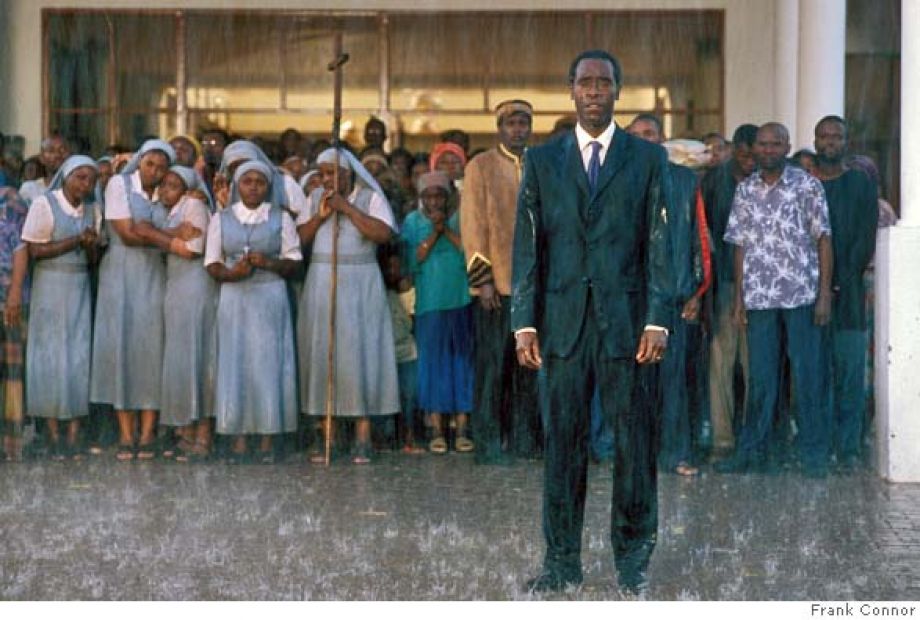
Note — This post is by Gillian Elder, a freshman in the Honors College at Oakland University majoring in International Studies. Students in my course, International Relations on Film, are contributing posts to the blog reflecting on the movies we are watching in class and the ideas those films are helping us to think about. Gillian’s piece is presented here with minor editing.
The film, Hotel Rwanda, recounts the events of the Rwandan genocide of 1994 from the perspective of Paul Rusesabagina (Don Cheadle) and the refugees that have taken shelter in the Hôtel des Mille-Collines which he manages.
Through its depiction of what happened in Rwanda, the systematic slaughter of more than 800,000 mainly Tutsi civilians in only 100 days, the film invites discussion of the problems of humanitarian intervention and what can and should be done to solve such complex problems quickly and effectively. It also gives us a chance to think about how to improve crisis response to prevent instances like Rwanda from taking so many civilian lives, should they occur in the future.
As former UN Secretary General Kofi Annan has observed, “in many of today’s conflicts, civilians have become the main targets of violence,” proportionally, 75 percent are civilian casualties. As tensions between Hutu and Tutsi reaches a breaking point and civil war erupts, the United Nations is called in to maintain a non-existent peace. But as the film shows over and over, the UN intervention force is hardly given the means or the men to do so effectively.
Despite the fact that large refugee flows are rightly seen as a humanitarian emergency, states were unwilling to use the word “genocide” to describe what was happening. They were unwilling to invoke the word given the political, legal, and moral ramifications that came with it.
This observation is painfully evident in the film when we hear an audio clip of an actual statement by a US State Department spokeswoman during a press conference about the events occurring in Rwanda. The American official says “we are aware acts of genocide may have been committed” but is “not in a position to answer” whether or not it is considered to be genocide.
The international community’s hesitance and indecisiveness in defending the Rwandan civilians, and later the UN’s decision to withdraw nearly all of their peacekeepers from the country, results in the loss of hundreds of thousands of lives.
Many nations fear involvement in civil crises that would morally obligate them to step in, even when civilians have no one else to defend them. But if these nations were to combine their military strategies with addressing the underlying sources of conflict, and committing to their actions as they resolve the complex conflict at hand, losses can be contained. Even in a place like Rwanda.
Political scientists Jon Western and Joshua S. Goldstein argue that the emotional impact of crises like Rwanda are “heightened by new communications technologies that transmitted graphic images of human suffering across the world.” Yet this may not be enough to trigger an international response.
In Hotel Rwanda, Joaquin Phoenix’s minor role as journalist Jack Daglish shows this in action. He is the reminder of how publicized the Rwandan genocide was, how the world could see it unfold in near real time. Phoenix’s character is the embodiment of the fact that the world was watching and choosing not to act.
The international community acted to save its own, evacuating Europeans and other Westerners but abandoning Rwandans to their bloody fate. By dramatizing this sorry episode, Hotel Rwanda presents the moral dilemmas that lurk behind international interventions, and highlights the international community’s ultimate failure to, as Annan wrote, “reaffirm faith in…the dignity and worth of the human person.”
I really liked that you commented on the character of Jack Danglash and what he really represented. Without deeper insight, he appears to be just another one of the Europeans. But with analyzing his character a little more you see that he represented the worlds refusal to help this tragedy, while they stood by and watched with all the facts. The reference to the U.S. spokeswoman really helped to drive that point home as well, great work!